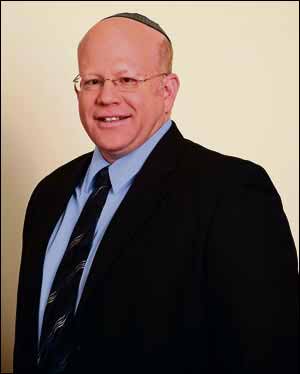|
PROFILE Amichai's pride at law department | |
LEGAL expert Professor Amichai Cohen believes lawyers should care about people and their problems and not just about big business and self-interest.
Next month, Prof Cohen becomes dean of Israel's Ono Academic College's law faculty. He is proud that his department operates the largest number of law clinics of any Israeli academic institution. Members of the public can receive free legal advice from students, supervised by accredited lawyers, at these clinics. Prof Cohen - who is consulted by the media particularly in relation to armed conflict, in which Israel repeatedly sees itself involved - carries his humanitarian concerns into the international arena. Discussing the current situation in Syria and its possible ramifications on Israel, Prof Cohen said: "To the Israeli public what is better for Israel is only part of the picture. "Israelis are really appalled by the fact that a few kilometres beyond their border, tens of thousands of civilians are under constant threat. "Although they are our enemy, we care about the suffering of the Syrian people. Their refugees go to Israeli hospitals. You can't be a human being and not support war victims." Prof Cohen was born in Oxford where his father, historian Prof Stuart Cohen, was studying for his PhD. His parents made aliya with him when he was a year old. The thorniest aspect of international law for Israel is its West Bank settlements which are considered by many to be illegal. It was in these supposedly illegal territories that Prof Cohen junior did his hesder (combined army and yeshiva service), based in Gush on the West Bank. His ambivalent attitude to the territories fuelled his interest in international law. And with all his expertise in the subject, Prof Cohen, who graduated from Yale Law School, as well as from the Hebrew University, is still ambivalent on the issue. "The question of settlements is legally problematic," he said. "It is now more political than legal and subject to international negotiations. "Politically there should be some agreement although the idea that Israel would withdraw from all territories is quite unrealistic." He added: "Many questions in international law are focused on Israel. Israel is a unique example of a law-abiding democracy that is constantly engaged in some kind of conflict. "Israelis are trying to engage in international law while being in armed conflict. It is a test case for many questions. "Israel makes an enormous effort not only for moral reasons, but for utilitarian reasons because the entire world looks at Israel and Israel knows that every act will be scrutinised by international commissions." He continued: "In every armed conflict there are some violations, but Israel makes a lot of effort not to hurt civilians." Turning to the ongoing crisis in Syria, he said that there was an emerging opinion within international law that a nation should be allowed to go to war not only in self defence or to protect an ally, but also in the event of a "humanitarian crisis". Prof Cohen said: "There is an ongoing humanitarian crisis in Syria. One hundred thousand people have already been killed. Why are we only reacting now? "Because chemical weapons, which are a clear violation of international law, mean more. What happens if it becomes a habit? "We know Iran is looking and waiting to see if the great democracies are able to do anything. It is worrying." Israel, he said, was correctly staying below the radar and not taking sides publicly. Although Bashar Assad was, he said, one of the worst rulers in the world today, killing hundreds of thousands of his own people, it was not clear that an alternative regime would be better for Israel. Prof Cohen recently went with his father and eldest son on a barmitzvah trip to the UK to explore their British roots.
|
